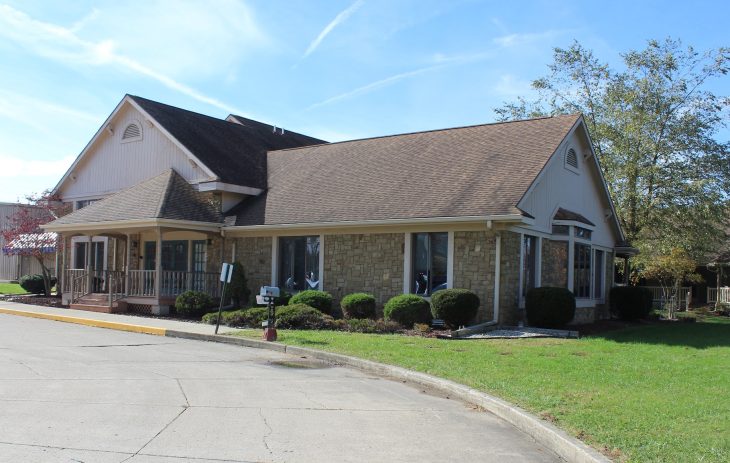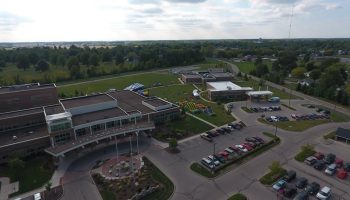About Bridges of Hope Treatment Center
Bridges of Hope provides comprehensive substance addiction treatment for adults. You’ll find ’em located in a semi-suburban corner of Anderson, Indiana. They’re not too far from the Anderson Roll Arena or the Shady Side Park and Playplace. It’s a premier drug and alcohol detox center that’s available 24/7 to help guests through complex withdrawal for multiple drug addictions and co-occurring mental health problems.
They provide medically supervised detox and a qualified staff to supervise your treatment regimen. You’ll have a thorough medical assessment to determine your health history and substance use background. The detox process typically takes 2-10 days for alcohol and up to 8 weeks for harder substances. It all depends on the severity of symptoms and the substance used.
You’ll have a safe and comfortable setting to start healing. Once detox is completed, you’ll may transition to the residential treatment program. Here, the staff emphasizes education regarding addiction and coping skills for successful recovery. You won’t go through this process alone. There are social activities to keep you connected and engaged with others, along with 12 Step recovery meetings.
They offer recreational activities that include being active. You can partake in their fitness center, play in a full-size basketball court, fish, compete in video and board games, and have outdoor adventures. Clients can attend yoga sessions and meditate for relaxation and clear their minds. They have outdoor areas where you can unwind and enjoy the serene views. You can also smoke in limited areas and at designated times. But you aren’t allowed to bring vapes or lighters.
Family involvement is welcome and a vital component of their recovery services. Their program will help build communication, restore trust, and encourage loved ones throughout the process.
Bridges of Hope works with many health insurance companies that include Magellan, Blue Cross Blue Shield, and Humana.
Levels of Care
-
Inpatient
Inpatient and residential programs provide round-the-clock medical and emotional support as you live at the treatment facility. This level of care may be recommended if you have severe addictions or mental health conditions since it removes outside distractions and allows you to focus solely on therapy.
-
PHP
Partial hospitalization programs provide comprehensive treatment in a structured setting during the day but allow you to return home at night. These programs offer a balance of inpatient and outpatient rehab and provide intensive support without full time residency.
-
Outpatient
In outpatient therapy, you’ll attend therapy sessions several times each week while living at home. This is ideal if you have a strong support system and a lower risk of relapse. Outpatient treatment offers flexibility to maintain work, school or family obligations.
-
Aftercare
Aftercare programs provide ongoing support after you complete a rehab program. They may include several components to help you maintain sobriety including therapy, community support groups and relapse prevention strategies. This gives you a network of resources as you reintegrate into your daily life.
-
Dual Diagnosis
Dual diagnosis programs address substance use disorders and co-occurring mental health conditions simultaneously. This integrated approach to care improves the likelihood of long term recovery and stability by addressing the root causes of addiction.
-
Sober Living
Sober living homes provide a supportive and substance free environment for you to live in as you overcome your addiction. Residents must follow house rules and support each other's recovery journeys. Sober living fosters accountability and stability during this critical phase of recovery.
Detox Service Setting
-
Inpatient Detox
Inpatient detox occurs in a dedicated treatment facility. You’ll live there around the clock and receive intensive medical support and supervision to help manage your withdrawal symptoms. It is suitable for individuals with moderate to severe addictions as it ensures a stable detox environment.
-
Outpatient Detox
Outpatient detox gives you access to medically supervised withdrawal services while still allowing you to live at home. You’ll attend a clinic for treatment and monitoring. This flexible option is suitable for those with mild to moderate withdrawal symptoms who have strong support systems.
-
MAT
Medication assisted treatment combines medication and counseling to manage withdrawal and reduce cravings for opioid and alcohol addiction. Medications may include methadone, buprenorphine or naltrexone. MAT is tailored to your needs so you can actively participate in your treatment journey.
Programs
-
Adult (18+)
Adult programs address the substance use and life challenges specific to adults. Therapists can deliver sessions in individual, group and family settings. Services often include job support and life skills training in a structured environment.
-
Alcohol Detox
Alcohol detox programs offer medical support to help individuals withdraw safely from alcohol. Your care team may use medications to ease your symptoms and provide medical monitoring to address complications.
-
Cognitive Behavioral Therapy
Cognitive behavioral therapy focuses on changing harmful thought patterns and behaviors associated with addiction. You’ll learn healthier coping mechanisms by identifying and replacing negative thoughts. This improves your emotional resilience and decreases your relapse potential.
-
Men
Men's programs address substance use while also considering the social pressures, family roles and mental health concerns that are specific to men. You’ll learn healthy coping mechanisms as you build emotional resilience and develop communication skills.
-
Opioid Detox
Opioid detox uses medications to ease severe withdrawal symptoms. It also includes medical supervision to help you manage potential complications. These services allow you to stabilize and begin a recovery plan.
-
Women
Women's programs offer a safe and supportive space to focus on gender specific issues such as trauma, family roles and mental health conditions. Therapists tailor the sessions to address women's needs and foster empowerment in a healing and nurturing environment.
-
Young Adult (18 - 25)
Young adult programs are designed for individuals who are transitioning into adulthood. Topics of discussion typically include identity, independence and peer relationships. Providers may also offer life skills training and career support.
Payment Options
- Military Insurance
- Private Insurance
- Self Pay
Accreditations
-
 NAATP
NAATP
-
 Joint Commission
Joint Commission
Amenities
- Fitness Center
- Hiking
- Lakeside
- Private Transportation
- Yoga Studio
Contact
2200 North Madison Avenue
Anderson, IN 46011





